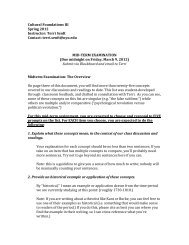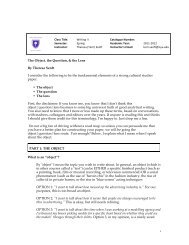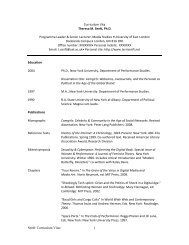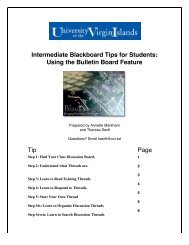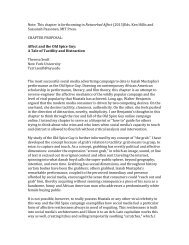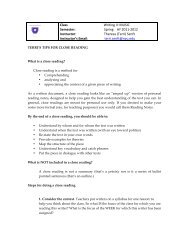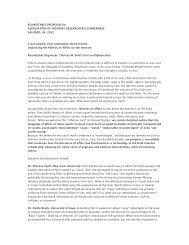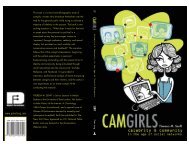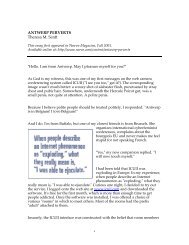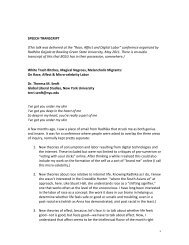New York University Gallatin School of Individualized ... - Terri Senft
New York University Gallatin School of Individualized ... - Terri Senft
New York University Gallatin School of Individualized ... - Terri Senft
You also want an ePaper? Increase the reach of your titles
YUMPU automatically turns print PDFs into web optimized ePapers that Google loves.
Who Are You? Your Intellectual Autobiography<br />
At the beginning <strong>of</strong> your Colloquium you will be invited to take the first 15 minutes or so to talk<br />
about yourself, your program <strong>of</strong> study and how you came to be interested in the issues you raise in<br />
your rationale. If you have not completed an Intellectual Autobiography and Plan for Concentration<br />
(IAPC), the following exercise should help you. Even if you have written an IAPC, you may want to<br />
do this exercise again. As you move towards graduation it is very important that you gain practice<br />
in describing orally what you did at <strong>Gallatin</strong> so that it makes sense to outsiders.<br />
You might discuss some <strong>of</strong> the following:<br />
a) How you came to be studying at <strong>Gallatin</strong>.<br />
b) Things you learned in different settings (in <strong>Gallatin</strong> or in other parts <strong>of</strong> the university, in<br />
workshops as well as in classes, including if relevant your internships and/or pr<strong>of</strong>essional life).<br />
c) How you understand your studies and the themes you have chosen for your colloquium<br />
relating to your own history, your concentration, and/or your interests more generally.<br />
Feel free to organize your essay however you like--you are not obligated to consider a) b) and c) in<br />
any particular sequence, nor should you feet compelled to cover them in an artificially exhaustive<br />
manner. Once you finish your first draft, go through and cut out personal information that doesn’t<br />
tie into your life as a scholar. For instance, if your concentration is in cognition and sentience, it is<br />
right and appropriate to say something like, “Ever since I arrived in <strong>New</strong> <strong>York</strong> from Pakistan, I’ve<br />
been interested in how the phenomenon <strong>of</strong> diaspora shapes self-identity. ” However, statements<br />
like, “I initially came to <strong>Gallatin</strong> because I didn’t really know what to do” or “I chose my classes<br />
mainly because they allowed me to take internships in the real world” doesn’t tell your readers<br />
anything positive about you as an intellectual.<br />
3 <strong>of</strong> 20



